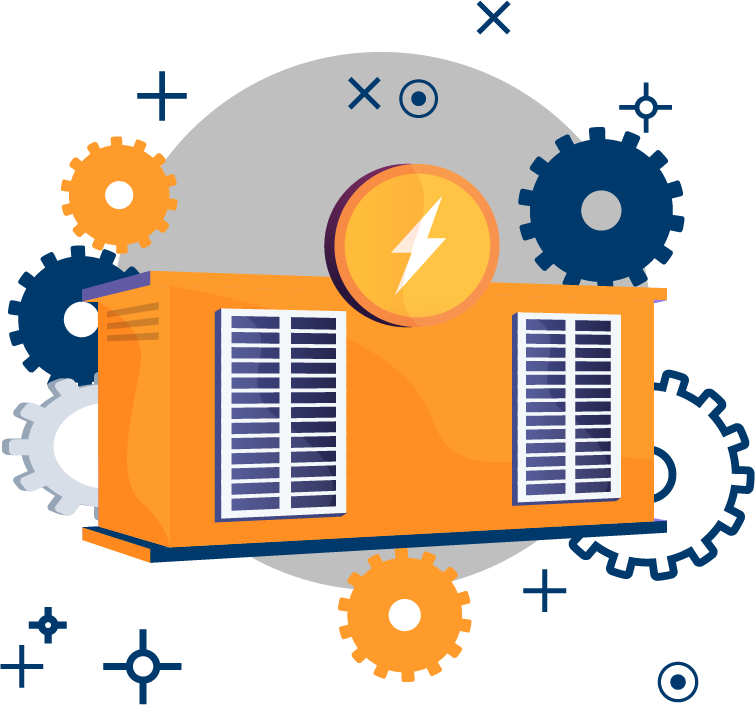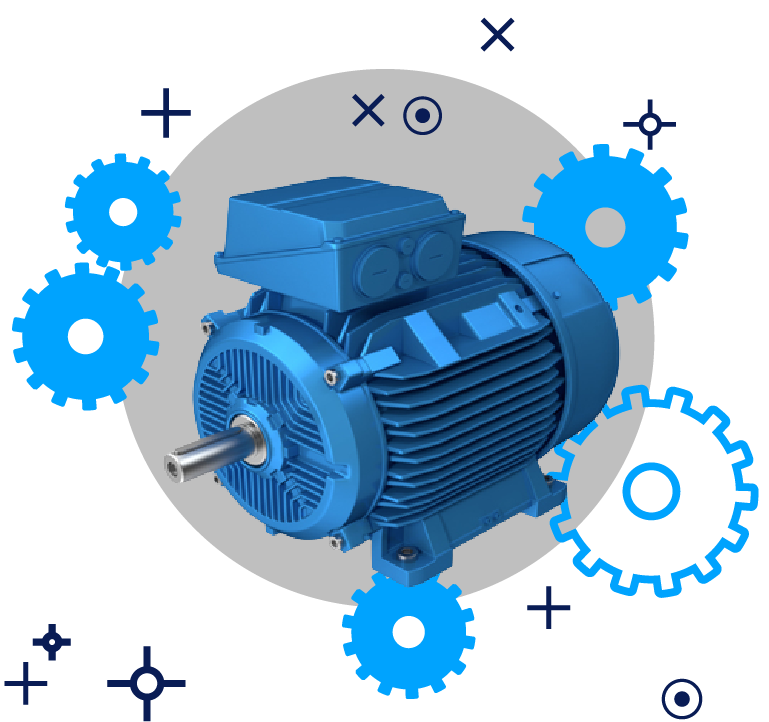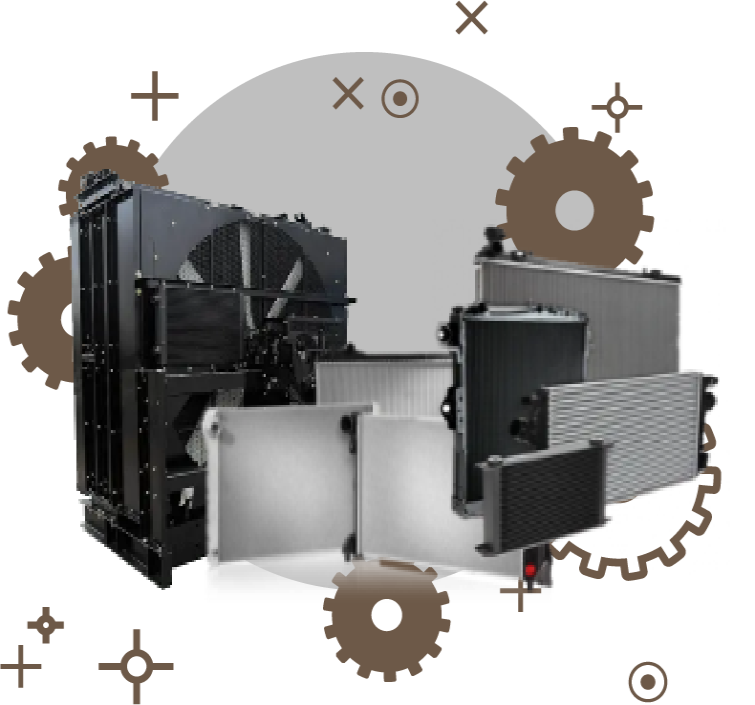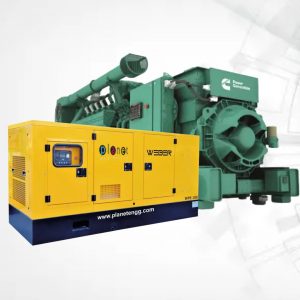Technical FAQ's
Our Technical FAQ’s are one of the key elements of comprehensive user assistance and plays a key role in customer satisfaction.

Frequently Asked Questions
Technical FAQ’s answers to illustrate for information which can help our customers & visitors to understand the technical aspects.

Technical FAQ's
Diesel Generators
- Regular service checks
- Regular oil changes
- Regular filter changes
- Use quality diesel fuel
- Regular testing
- Don’t use diesel fuel that has been stored for more than one year
- Keep the generator in a well-ventilated area
- Never run your diesel generator without proper cooling or ventilation
- Always have someone nearby to help with refueling if you are not able to do it yourself
- Make sure the machine is off before you start refueling
- Diesel generators are not designed to be stored outside
- It is essential to keep the fuel tank at least half full, but no more than 2/3 full
- If you have a generator that has an automatic shutdown feature, make sure it is turned on
- Keep your generator away from water and moisture – this includes rainwater
- Be careful when refueling your generator – don’t spill any fuel or oil on the ground
- Always wear gloves when working with diesel fuel or oil, even if you’re just changing the filter, topping off gas tanks, etc.; they will protect against burns and cuts as well as contamination of skin and clothing
In addition to conducting a visual inspection, experienced technicians always ensure to have a generator maintenance checklist which ensures that they have a look at some of the most important aspects, including but not limited to –
- The engine speeds
- The fluid and oil levels
- Oil filter and air filters
- The belts, hoses, lines, connectors, and any other accessories
- The control panel as well as the engine
- The cooling system
- Generator supply connections
- Battery cables and battery terminals
- The exhaust system, and so on
Regularly checking all these aspects ensures that your generator performs optimally at all time
It is so critical to the 24×7 operations of some applications like banks, agriculture, and healthcare facilities to have backup power supplies.
- Power Rating (kVA)
- Compliance
- Quality and Durability
- Prime/Standby Applications
Dedicated aftermarket support during and after warranty period.
Technical FAQ's
Motor Rewinding
Technical FAQ’s
Technical FAQ's
Our Technical FAQ’s are one of the key elements of comprehensive user assistance and plays a key role in customer satisfaction.

Frequently Asked Questions
Technical FAQ’s answers to illustrate for information which can help our customers & visitors to understand the technical aspects.

Technical FAQ's
Diesel Generators
- Regular service checks
- Regular oil changes
- Regular filter changes
- Use quality diesel fuel
- Regular testing
- Don’t use diesel fuel that has been stored for more than one year
- Keep the generator in a well-ventilated area
- Never run your diesel generator without proper cooling or ventilation
- Always have someone nearby to help with refueling if you are not able to do it yourself
- Make sure the machine is off before you start refueling
- Diesel generators are not designed to be stored outside
- It is essential to keep the fuel tank at least half full, but no more than 2/3 full
- If you have a generator that has an automatic shutdown feature, make sure it is turned on
- Keep your generator away from water and moisture – this includes rainwater
- Be careful when refueling your generator – don’t spill any fuel or oil on the ground
- Always wear gloves when working with diesel fuel or oil, even if you’re just changing the filter, topping off gas tanks, etc.; they will protect against burns and cuts as well as contamination of skin and clothing
In addition to conducting a visual inspection, experienced technicians always ensure to have a generator maintenance checklist which ensures that they have a look at some of the most important aspects, including but not limited to –
- The engine speeds
- The fluid and oil levels
- Oil filter and air filters
- The belts, hoses, lines, connectors, and any other accessories
- The control panel as well as the engine
- The cooling system
- Generator supply connections
- Battery cables and battery terminals
- The exhaust system, and so on
Regularly checking all these aspects ensures that your generator performs optimally at all time
It is so critical to the 24×7 operations of some applications like banks, agriculture, and healthcare facilities to have backup power supplies.
- Power Rating (kVA)
- Compliance
- Quality and Durability
- Prime/Standby Applications
Dedicated aftermarket support during and after warranty period.
Technical FAQ's
Motor Rewinding
Technical FAQ’s
wppleadmin
Leave a Replay
About Me
Lorem ipsum dolor sit amet, consectetur adipiscing elit. Ut elit tellus, luctus nec ullamcorper mattis, pulvinar dapibus leo.
Recent Posts
Follow Us
Weekly Tutorial
Sign up for our Newsletter
Click edit button to change this text. Lorem ipsum dolor sit amet, consectetur adipiscing elit
- Don’t use diesel fuel that has been stored for more than one year
- Keep the generator in a well-ventilated area
- Never run your diesel generator without proper cooling or ventilation
- Always have someone nearby to help with refueling if you are not able to do it yourself
- Make sure the machine is off before you start refueling
- Diesel generators are not designed to be stored outside
- It is essential to keep the fuel tank at least half full, but no more than 2/3 full
- If you have a generator that has an automatic shutdown feature, make sure it is turned on
- Keep your generator away from water and moisture – this includes rainwater
- Be careful when refueling your generator – don’t spill any fuel or oil on the ground
- Always wear gloves when working with diesel fuel or oil, even if you’re just changing the filter, topping off gas tanks, etc.; they will protect against burns and cuts as well as contamination of skin and clothing
In addition to conducting a visual inspection, experienced technicians always ensure to have a generator maintenance checklist which ensures that they have a look at some of the most important aspects, including but not limited to –
- The engine speeds
- The fluid and oil levels
- Oil filter and air filters
- The belts, hoses, lines, connectors, and any other accessories
- The control panel as well as the engine
- The cooling system
- Generator supply connections
- Battery cables and battery terminals
- The exhaust system, and so on
Regularly checking all these aspects ensures that your generator performs optimally at all time
It is so critical to the 24×7 operations of some applications like banks, agriculture, and healthcare facilities to have backup power supplies.
- Power Rating (kVA)
- Compliance
- Quality and Durability
- Prime/Standby Applications
Dedicated aftermarket support during and after warranty period.


Technical FAQ's
Fuel Injection Systems
- Regular service checks
- Regular oil changes
- Regular filter changes
- Use quality diesel fuel
- Regular testing
- Don’t use diesel fuel that has been stored for more than one year
- Keep the generator in a well-ventilated area
- Never run your diesel generator without proper cooling or ventilation
- Always have someone nearby to help with refueling if you are not able to do it yourself
- Make sure the machine is off before you start refueling
- Diesel generators are not designed to be stored outside
- It is essential to keep the fuel tank at least half full, but no more than 2/3 full
- If you have a generator that has an automatic shutdown feature, make sure it is turned on
- Keep your generator away from water and moisture – this includes rainwater
- Be careful when refueling your generator – don’t spill any fuel or oil on the ground
- Always wear gloves when working with diesel fuel or oil, even if you’re just changing the filter, topping off gas tanks, etc.; they will protect against burns and cuts as well as contamination of skin and clothing
In addition to conducting a visual inspection, experienced technicians always ensure to have a generator maintenance checklist which ensures that they have a look at some of the most important aspects, including but not limited to –
- The engine speeds
- The fluid and oil levels
- Oil filter and air filters
- The belts, hoses, lines, connectors, and any other accessories
- The control panel as well as the engine
- The cooling system
- Generator supply connections
- Battery cables and battery terminals
- The exhaust system, and so on
Regularly checking all these aspects ensures that your generator performs optimally at all time
It is so critical to the 24×7 operations of some applications like banks, agriculture, and healthcare facilities to have backup power supplies.
- Power Rating (kVA)
- Compliance
- Quality and Durability
- Prime/Standby Applications
Dedicated aftermarket support during and after warranty period.
Technical FAQ's
Radiators & Heat Exchangers
Technical FAQ’s
wppleadmin
Leave a Replay
About Me
Lorem ipsum dolor sit amet, consectetur adipiscing elit. Ut elit tellus, luctus nec ullamcorper mattis, pulvinar dapibus leo.
Recent Posts
Follow Us
Weekly Tutorial
Sign up for our Newsletter
Click edit button to change this text. Lorem ipsum dolor sit amet, consectetur adipiscing elit
- Don’t use diesel fuel that has been stored for more than one year
- Keep the generator in a well-ventilated area
- Never run your diesel generator without proper cooling or ventilation
- Always have someone nearby to help with refueling if you are not able to do it yourself
- Make sure the machine is off before you start refueling
- Diesel generators are not designed to be stored outside
- It is essential to keep the fuel tank at least half full, but no more than 2/3 full
- If you have a generator that has an automatic shutdown feature, make sure it is turned on
- Keep your generator away from water and moisture – this includes rainwater
- Be careful when refueling your generator – don’t spill any fuel or oil on the ground
- Always wear gloves when working with diesel fuel or oil, even if you’re just changing the filter, topping off gas tanks, etc.; they will protect against burns and cuts as well as contamination of skin and clothing
In addition to conducting a visual inspection, experienced technicians always ensure to have a generator maintenance checklist which ensures that they have a look at some of the most important aspects, including but not limited to –
- The engine speeds
- The fluid and oil levels
- Oil filter and air filters
- The belts, hoses, lines, connectors, and any other accessories
- The control panel as well as the engine
- The cooling system
- Generator supply connections
- Battery cables and battery terminals
- The exhaust system, and so on
Regularly checking all these aspects ensures that your generator performs optimally at all time
It is so critical to the 24×7 operations of some applications like banks, agriculture, and healthcare facilities to have backup power supplies.
- Power Rating (kVA)
- Compliance
- Quality and Durability
- Prime/Standby Applications
Dedicated aftermarket support during and after warranty period.

wppleadmin
Leave a Replay
About Me
Lorem ipsum dolor sit amet, consectetur adipiscing elit. Ut elit tellus, luctus nec ullamcorper mattis, pulvinar dapibus leo.
Recent Posts
Follow Us
Weekly Tutorial
Sign up for our Newsletter
Click edit button to change this text. Lorem ipsum dolor sit amet, consectetur adipiscing elit
- Don’t use diesel fuel that has been stored for more than one year
- Keep the generator in a well-ventilated area
- Never run your diesel generator without proper cooling or ventilation
- Always have someone nearby to help with refueling if you are not able to do it yourself
- Make sure the machine is off before you start refueling
- Diesel generators are not designed to be stored outside
- It is essential to keep the fuel tank at least half full, but no more than 2/3 full
- If you have a generator that has an automatic shutdown feature, make sure it is turned on
- Keep your generator away from water and moisture – this includes rainwater
- Be careful when refueling your generator – don’t spill any fuel or oil on the ground
- Always wear gloves when working with diesel fuel or oil, even if you’re just changing the filter, topping off gas tanks, etc.; they will protect against burns and cuts as well as contamination of skin and clothing
In addition to conducting a visual inspection, experienced technicians always ensure to have a generator maintenance checklist which ensures that they have a look at some of the most important aspects, including but not limited to –
- The engine speeds
- The fluid and oil levels
- Oil filter and air filters
- The belts, hoses, lines, connectors, and any other accessories
- The control panel as well as the engine
- The cooling system
- Generator supply connections
- Battery cables and battery terminals
- The exhaust system, and so on
Regularly checking all these aspects ensures that your generator performs optimally at all time
It is so critical to the 24×7 operations of some applications like banks, agriculture, and healthcare facilities to have backup power supplies.
- Power Rating (kVA)
- Compliance
- Quality and Durability
- Prime/Standby Applications
Dedicated aftermarket support during and after warranty period.


Technical FAQ's
Fuel Injection Systems
- Regular service checks
- Regular oil changes
- Regular filter changes
- Use quality diesel fuel
- Regular testing
- Don’t use diesel fuel that has been stored for more than one year
- Keep the generator in a well-ventilated area
- Never run your diesel generator without proper cooling or ventilation
- Always have someone nearby to help with refueling if you are not able to do it yourself
- Make sure the machine is off before you start refueling
- Diesel generators are not designed to be stored outside
- It is essential to keep the fuel tank at least half full, but no more than 2/3 full
- If you have a generator that has an automatic shutdown feature, make sure it is turned on
- Keep your generator away from water and moisture – this includes rainwater
- Be careful when refueling your generator – don’t spill any fuel or oil on the ground
- Always wear gloves when working with diesel fuel or oil, even if you’re just changing the filter, topping off gas tanks, etc.; they will protect against burns and cuts as well as contamination of skin and clothing
In addition to conducting a visual inspection, experienced technicians always ensure to have a generator maintenance checklist which ensures that they have a look at some of the most important aspects, including but not limited to –
- The engine speeds
- The fluid and oil levels
- Oil filter and air filters
- The belts, hoses, lines, connectors, and any other accessories
- The control panel as well as the engine
- The cooling system
- Generator supply connections
- Battery cables and battery terminals
- The exhaust system, and so on
Regularly checking all these aspects ensures that your generator performs optimally at all time
It is so critical to the 24×7 operations of some applications like banks, agriculture, and healthcare facilities to have backup power supplies.
- Power Rating (kVA)
- Compliance
- Quality and Durability
- Prime/Standby Applications
Dedicated aftermarket support during and after warranty period.
Technical FAQ's
Radiators & Heat Exchangers
Technical FAQ’s
Technical FAQ's
Our Technical FAQ’s are one of the key elements of comprehensive user assistance and plays a key role in customer satisfaction.

Frequently Asked Questions
Technical FAQ’s answers to illustrate for information which can help our customers & visitors to understand the technical aspects.

Technical FAQ's
Diesel Generators
- Regular service checks
- Regular oil changes
- Regular filter changes
- Use quality diesel fuel
- Regular testing
- Don’t use diesel fuel that has been stored for more than one year
- Keep the generator in a well-ventilated area
- Never run your diesel generator without proper cooling or ventilation
- Always have someone nearby to help with refueling if you are not able to do it yourself
- Make sure the machine is off before you start refueling
- Diesel generators are not designed to be stored outside
- It is essential to keep the fuel tank at least half full, but no more than 2/3 full
- If you have a generator that has an automatic shutdown feature, make sure it is turned on
- Keep your generator away from water and moisture – this includes rainwater
- Be careful when refueling your generator – don’t spill any fuel or oil on the ground
- Always wear gloves when working with diesel fuel or oil, even if you’re just changing the filter, topping off gas tanks, etc.; they will protect against burns and cuts as well as contamination of skin and clothing
In addition to conducting a visual inspection, experienced technicians always ensure to have a generator maintenance checklist which ensures that they have a look at some of the most important aspects, including but not limited to –
- The engine speeds
- The fluid and oil levels
- Oil filter and air filters
- The belts, hoses, lines, connectors, and any other accessories
- The control panel as well as the engine
- The cooling system
- Generator supply connections
- Battery cables and battery terminals
- The exhaust system, and so on
Regularly checking all these aspects ensures that your generator performs optimally at all time
It is so critical to the 24×7 operations of some applications like banks, agriculture, and healthcare facilities to have backup power supplies.
- Power Rating (kVA)
- Compliance
- Quality and Durability
- Prime/Standby Applications
Dedicated aftermarket support during and after warranty period.
Technical FAQ's
Motor Rewinding
Technical FAQ’s
wppleadmin
Leave a Replay
About Me
Lorem ipsum dolor sit amet, consectetur adipiscing elit. Ut elit tellus, luctus nec ullamcorper mattis, pulvinar dapibus leo.
Recent Posts
Follow Us
Weekly Tutorial
Sign up for our Newsletter
Click edit button to change this text. Lorem ipsum dolor sit amet, consectetur adipiscing elit
- Don’t use diesel fuel that has been stored for more than one year
- Keep the generator in a well-ventilated area
- Never run your diesel generator without proper cooling or ventilation
- Always have someone nearby to help with refueling if you are not able to do it yourself
- Make sure the machine is off before you start refueling
- Diesel generators are not designed to be stored outside
- It is essential to keep the fuel tank at least half full, but no more than 2/3 full
- If you have a generator that has an automatic shutdown feature, make sure it is turned on
- Keep your generator away from water and moisture – this includes rainwater
- Be careful when refueling your generator – don’t spill any fuel or oil on the ground
- Always wear gloves when working with diesel fuel or oil, even if you’re just changing the filter, topping off gas tanks, etc.; they will protect against burns and cuts as well as contamination of skin and clothing
In addition to conducting a visual inspection, experienced technicians always ensure to have a generator maintenance checklist which ensures that they have a look at some of the most important aspects, including but not limited to –
- The engine speeds
- The fluid and oil levels
- Oil filter and air filters
- The belts, hoses, lines, connectors, and any other accessories
- The control panel as well as the engine
- The cooling system
- Generator supply connections
- Battery cables and battery terminals
- The exhaust system, and so on
Regularly checking all these aspects ensures that your generator performs optimally at all time
It is so critical to the 24×7 operations of some applications like banks, agriculture, and healthcare facilities to have backup power supplies.
- Power Rating (kVA)
- Compliance
- Quality and Durability
- Prime/Standby Applications
Dedicated aftermarket support during and after warranty period.


Technical FAQ's
Fuel Injection Systems
- Regular service checks
- Regular oil changes
- Regular filter changes
- Use quality diesel fuel
- Regular testing
- Don’t use diesel fuel that has been stored for more than one year
- Keep the generator in a well-ventilated area
- Never run your diesel generator without proper cooling or ventilation
- Always have someone nearby to help with refueling if you are not able to do it yourself
- Make sure the machine is off before you start refueling
- Diesel generators are not designed to be stored outside
- It is essential to keep the fuel tank at least half full, but no more than 2/3 full
- If you have a generator that has an automatic shutdown feature, make sure it is turned on
- Keep your generator away from water and moisture – this includes rainwater
- Be careful when refueling your generator – don’t spill any fuel or oil on the ground
- Always wear gloves when working with diesel fuel or oil, even if you’re just changing the filter, topping off gas tanks, etc.; they will protect against burns and cuts as well as contamination of skin and clothing
In addition to conducting a visual inspection, experienced technicians always ensure to have a generator maintenance checklist which ensures that they have a look at some of the most important aspects, including but not limited to –
- The engine speeds
- The fluid and oil levels
- Oil filter and air filters
- The belts, hoses, lines, connectors, and any other accessories
- The control panel as well as the engine
- The cooling system
- Generator supply connections
- Battery cables and battery terminals
- The exhaust system, and so on
Regularly checking all these aspects ensures that your generator performs optimally at all time
It is so critical to the 24×7 operations of some applications like banks, agriculture, and healthcare facilities to have backup power supplies.
- Power Rating (kVA)
- Compliance
- Quality and Durability
- Prime/Standby Applications
Dedicated aftermarket support during and after warranty period.
Technical FAQ's
Radiators & Heat Exchangers
Technical FAQ’s
wppleadmin
Leave a Replay
About Me
Lorem ipsum dolor sit amet, consectetur adipiscing elit. Ut elit tellus, luctus nec ullamcorper mattis, pulvinar dapibus leo.
Recent Posts
Follow Us
Weekly Tutorial
Sign up for our Newsletter
Click edit button to change this text. Lorem ipsum dolor sit amet, consectetur adipiscing elit
- Don’t use diesel fuel that has been stored for more than one year
- Keep the generator in a well-ventilated area
- Never run your diesel generator without proper cooling or ventilation
- Always have someone nearby to help with refueling if you are not able to do it yourself
- Make sure the machine is off before you start refueling
- Diesel generators are not designed to be stored outside
- It is essential to keep the fuel tank at least half full, but no more than 2/3 full
- If you have a generator that has an automatic shutdown feature, make sure it is turned on
- Keep your generator away from water and moisture – this includes rainwater
- Be careful when refueling your generator – don’t spill any fuel or oil on the ground
- Always wear gloves when working with diesel fuel or oil, even if you’re just changing the filter, topping off gas tanks, etc.; they will protect against burns and cuts as well as contamination of skin and clothing
In addition to conducting a visual inspection, experienced technicians always ensure to have a generator maintenance checklist which ensures that they have a look at some of the most important aspects, including but not limited to –
- The engine speeds
- The fluid and oil levels
- Oil filter and air filters
- The belts, hoses, lines, connectors, and any other accessories
- The control panel as well as the engine
- The cooling system
- Generator supply connections
- Battery cables and battery terminals
- The exhaust system, and so on
Regularly checking all these aspects ensures that your generator performs optimally at all time
It is so critical to the 24×7 operations of some applications like banks, agriculture, and healthcare facilities to have backup power supplies.
- Power Rating (kVA)
- Compliance
- Quality and Durability
- Prime/Standby Applications
Dedicated aftermarket support during and after warranty period.

wppleadmin
Leave a Replay
About Me
Lorem ipsum dolor sit amet, consectetur adipiscing elit. Ut elit tellus, luctus nec ullamcorper mattis, pulvinar dapibus leo.
Recent Posts
Follow Us
Weekly Tutorial
Sign up for our Newsletter
Click edit button to change this text. Lorem ipsum dolor sit amet, consectetur adipiscing elit
- Don’t use diesel fuel that has been stored for more than one year
- Keep the generator in a well-ventilated area
- Never run your diesel generator without proper cooling or ventilation
- Always have someone nearby to help with refueling if you are not able to do it yourself
- Make sure the machine is off before you start refueling
- Diesel generators are not designed to be stored outside
- It is essential to keep the fuel tank at least half full, but no more than 2/3 full
- If you have a generator that has an automatic shutdown feature, make sure it is turned on
- Keep your generator away from water and moisture – this includes rainwater
- Be careful when refueling your generator – don’t spill any fuel or oil on the ground
- Always wear gloves when working with diesel fuel or oil, even if you’re just changing the filter, topping off gas tanks, etc.; they will protect against burns and cuts as well as contamination of skin and clothing
In addition to conducting a visual inspection, experienced technicians always ensure to have a generator maintenance checklist which ensures that they have a look at some of the most important aspects, including but not limited to –
- The engine speeds
- The fluid and oil levels
- Oil filter and air filters
- The belts, hoses, lines, connectors, and any other accessories
- The control panel as well as the engine
- The cooling system
- Generator supply connections
- Battery cables and battery terminals
- The exhaust system, and so on
Regularly checking all these aspects ensures that your generator performs optimally at all time
It is so critical to the 24×7 operations of some applications like banks, agriculture, and healthcare facilities to have backup power supplies.
- Power Rating (kVA)
- Compliance
- Quality and Durability
- Prime/Standby Applications
Dedicated aftermarket support during and after warranty period.












